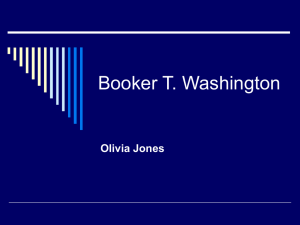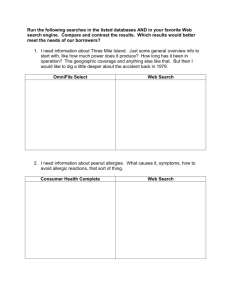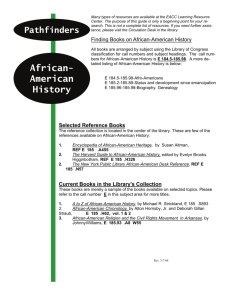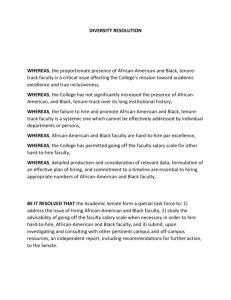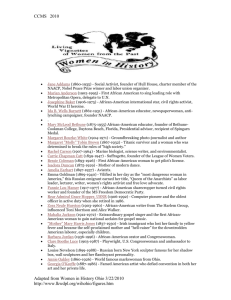African American Literature Bolos Syllabus
advertisement
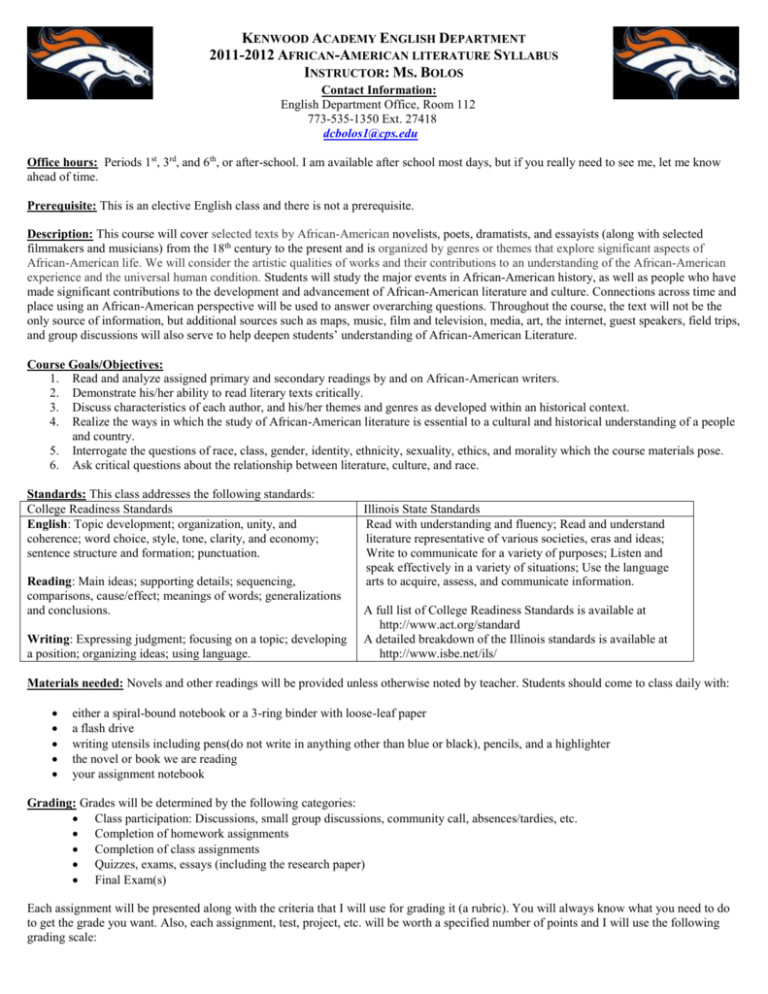
KENWOOD ACADEMY ENGLISH DEPARTMENT 2011-2012 AFRICAN-AMERICAN LITERATURE SYLLABUS INSTRUCTOR: MS. BOLOS Contact Information: English Department Office, Room 112 773-535-1350 Ext. 27418 dcbolos1@cps.edu Office hours: Periods 1st, 3rd, and 6th, or after-school. I am available after school most days, but if you really need to see me, let me know ahead of time. Prerequisite: This is an elective English class and there is not a prerequisite. Description: This course will cover selected texts by African-American novelists, poets, dramatists, and essayists (along with selected filmmakers and musicians) from the 18th century to the present and is organized by genres or themes that explore significant aspects of African-American life. We will consider the artistic qualities of works and their contributions to an understanding of the African-American experience and the universal human condition. Students will study the major events in African-American history, as well as people who have made significant contributions to the development and advancement of African-American literature and culture. Connections across time and place using an African-American perspective will be used to answer overarching questions. Throughout the course, the text will not be the only source of information, but additional sources such as maps, music, film and television, media, art, the internet, guest speakers, field trips, and group discussions will also serve to help deepen students’ understanding of African-American Literature. Course Goals/Objectives: 1. Read and analyze assigned primary and secondary readings by and on African-American writers. 2. Demonstrate his/her ability to read literary texts critically. 3. Discuss characteristics of each author, and his/her themes and genres as developed within an historical context. 4. Realize the ways in which the study of African-American literature is essential to a cultural and historical understanding of a people and country. 5. Interrogate the questions of race, class, gender, identity, ethnicity, sexuality, ethics, and morality which the course materials pose. 6. Ask critical questions about the relationship between literature, culture, and race. Standards: This class addresses the following standards: College Readiness Standards English: Topic development; organization, unity, and coherence; word choice, style, tone, clarity, and economy; sentence structure and formation; punctuation. Reading: Main ideas; supporting details; sequencing, comparisons, cause/effect; meanings of words; generalizations and conclusions. Writing: Expressing judgment; focusing on a topic; developing a position; organizing ideas; using language. Illinois State Standards Read with understanding and fluency; Read and understand literature representative of various societies, eras and ideas; Write to communicate for a variety of purposes; Listen and speak effectively in a variety of situations; Use the language arts to acquire, assess, and communicate information. A full list of College Readiness Standards is available at http://www.act.org/standard A detailed breakdown of the Illinois standards is available at http://www.isbe.net/ils/ Materials needed: Novels and other readings will be provided unless otherwise noted by teacher. Students should come to class daily with: either a spiral-bound notebook or a 3-ring binder with loose-leaf paper a flash drive writing utensils including pens(do not write in anything other than blue or black), pencils, and a highlighter the novel or book we are reading your assignment notebook Grading: Grades will be determined by the following categories: Class participation: Discussions, small group discussions, community call, absences/tardies, etc. Completion of homework assignments Completion of class assignments Quizzes, exams, essays (including the research paper) Final Exam(s) Each assignment will be presented along with the criteria that I will use for grading it (a rubric). You will always know what you need to do to get the grade you want. Also, each assignment, test, project, etc. will be worth a specified number of points and I will use the following grading scale: General Level Grading Scale: A = 100-90 B = 89-80 C = 79-70 D = 69-60 F = 59 and below Credits: Earning a D or above results in .5 credits per semester (1 credit for the entire year). Class Participation Points Each day, you earn 6 points for participation. These points are tallied up every two weeks and added as a grade in Gradebook (usually 50-60 points every 2 weeks). You lose these points due to the following reasons (otherwise called “non-participation”): You were absent, even if the absence is excused. If you were not in the room, you were not able to participate. You were tardy. This causes a loss of half the points (3 points). Coming to class on time is one of your most basic responsibilities as a student, and it’s not difficult. A pass from a teacher or staff member is, of course, allowed. Otherwise, you must have a Kenwood tardy pass to enter the room. You do not have an ID on. You have any kind of electronic device out. Using them behind your bags, under your desks, sticking a little out of your pockets, etc., is not okay. You will lose all the points for the day that way. Being disruptive or disrespectful in any way. Having your head down or falling asleep. Obviously, if there’s a special situation going on, please let me know at the beginning of class. Homework: Students will have regular homework including reading, writing and reviewing. It is crucial for students to complete all reading assignments, as they are necessary for class activities, quizzes, tests and writing assignments. Assignments should be typed when required, or hand written in blue or black ink as directed. Homework will be checked off or collected at the beginning of class and will be considered late if it is turned in at another time. Note that if I go over the homework in class, you will not be allowed to turn it in late. Class absences/Make-up work policy: All absences require a note from home in order to be excused by the teacher and the attendance office. It will not be acceptable to say that your note is in the attendance office- you must provide me with an original or copy. Missed tests and quizzes due to excused absences must be taken the day the student returns to school. Arrangements must be made to make up missed exams outside of class time. Late assignments due to excused absences will be accepted for full credit on the day the student returns to school. Sign-outs for school activities require 24-hour notice (permission given only if passing). I will update the class website daily. If you are absent, this is a great way to get the handouts/homework. Any notes that taken in class when you are absent are your responsibility to get. You can either get the notes from a classmate or I will keep a binder of the PPT presentations I give in class. You may not take the binder out of class. You must make time after/before class to see me about the binder. Absence from class has a direct impact on the level of success in this class. When you are absent please approach me after class or during my office hours to discuss what you missed. Do not ask me in the middle of class. ***Tardiness and Absences (excused and unexcused) will have a direct impact on your class participation grade. Sign-outs for school activities require 24-hour notice (permission given only if passing). And if you forget to get my signature and/or forge my signature on such a document, I will find out and there will be consequences. Late Work Any work that is not turned in the moment it is due will be considered late (not the end of the period and not the end of the day). Late assignments can earn a maximum of 50% credit. After one week from the due date of a regular assignment/project, you can no longer turn it in, even late. After one week from when a quiz/exam was given, you can no longer make it up. Make sure you check the Kenwood website or with me to get all make up work. Remember, everything is posted there and updated frequently. Lastly, if you are tardy to class and miss a quiz, you may not make up the quiz – you will receive a “0”. Class Rules and Expectations: I have high expectations for my students. And we must remember that we will strive for success collectively. 1. Students must come to class on time every day, have an ID on, be prepared with necessary materials, and be prepared to think and work. 2. Any student arriving after the bell must get a tardy pass. Also, you will only be allowed one bathroom/hallway pass per quarter. 3. The possession or use of a cell phone in the classroom will result in a loss of your class participation points for the day and I will confiscate your phone which will result in a parent coming to pick it up. Do not even have your phone sitting on your desk- I don’t want to see it – AT ALL. 4. Plagiarism is copying someone else’s work or ideas and passing them off as your own. Plagiarized work will receive an F. 5. Food is not allowed in the classroom. 6. I will grade your papers, tests, and assignments in a fair and timely fashion. I will offer suggestions for improvement and I will take improvement into consideration when grading future assignments. If you feel that I have graded a paper, homework assignment, or test unfairly, talk to me about it. I can make mistakes, and I will listen to what you have to say. I value and respect your opinions. 7. I am always willing to help students. If there are issues related to what we read, write or discuss I always have time to address the issues. Ask questions. Please. I love them. Be brave, sometimes the question you have is one other people are too afraid to ask. 8. I expect our classroom to be a safe place for ALL students. Students will exhibit courtesy and respect toward all other students at all times. Hateful comments or disrespectful language concerning race, gender, sexuality, political views, appearance, or of any other type 9. will not be tolerated; this applies to serious as well as “joking” comments. If you feel at any time that another student is violating this policy please see me. ***All of these things will have a direct impact on your grade in this class! If we have a guest speaker or artist in residence in the classroom, you will be on your best behavior. This also goes for field trips. If you misbehave on a field trip there aren’t any second chances, you will not be allowed to go on another field trip. Guidelines for Success/How to Study For This Course: 1. Come to class on time every day and: be prepared, be awake (mentally and physically), and pay attention. 2. Take good notes. Most of my lectures are in PowerPoint format and usually I will provide a Cornell Notes template for you. 3. I only give homework to help you practice what you learn in class, so, PRACTICE. I go over the homework in class the next day, take note on what you need to improve upon. 4. If you are expected to read something before class, READ. While I do not have a problem with you using Sparknotes as a supplement, do not think you can just read Sparknotes and you will be prepared. 5. Review your notes a couple of times a week. If you do this, you will not have to cram for a quiz or a test. Quarter 1: 9/6/11-11/10/11 In-service: 9/23/11, 10/28/11 Holidays: 10/10/11 The African-American Dream Text(s): My America – Langston Hughes, Mother to Son - Langston Hughes, Sympathy – Paul Lawrence Dunbar, The Bird in the Cage – Effie Lee Newsome, Sonnet to a Negro in Harlem – Helene Johnson, Sam Smiley – Sterling A. Brown, Yet I Do Marvel – Countee Cullen, We Wear the Mask – Paul Lawrence Dunbar, The Tropics in New York – Claude McKay, Outcast – Claude McKay, I Dream a World – Langston Hughes, America – Claude McKay, A Summer Tragedy – Arna Bontemps . The student will be able to: understand the idea of the American Dream and have the opportunity to begin responding to questions and posing their own inquiries regarding what the American Dream means to them. identify various forms of discrimination against African Americans in the Jim Crow era. read and compare various poems about the American Dream. compare and contrast the idea of the American Dream for African-Americans of the past and African-Americans today. learn from the examples of voices in the past in order to shape their own futures. understand the role the Harlem Renaissance played in how people defined the American Dream. Unit 2: The South as Literary Landscape Text(s): Their Eyes Were Watching God Zora Neale Hurston Selections from Frederick Douglass, Margaret Walker, Richard Wright, Billie Holiday, Arrested Development The student will be able to: interpret and analyze the American South as a complicated landscape in African-American literature. understand the Slave Narrative’s political and personal impetus and purposes. understand the culture of the South and the part it plays in African-American literature. understand the South as a symbolic location. Quarter 2: 11/14/11- 1/27/12 Parent/Teacher Conference: 11/17/11 In-service: 11/18/11 Holidays: 11/24-25/11, 1/16/12 Winter Break: 12/24-1/6/12 Unit 3: Stories of Migration Text(s): Selections from Richard Wright, Ma Rainey, Toni Morrison, Ralph Ellison The student will be able to: understand the history of the African presence in the Americas. understand that people migrate or relocate for various reasons. understand that literature and art can reflect events in people’s lives and in society at large. understand a character’s journey from enslavement to freedom. Unit 4: Expressions of Blues, Jazz, and Hip-Hop Text(s): Selections from Bessie Smith, Langston Hughes, Sterling Brown, Amiri Baraka, Tupac Shakur, Gwendolyn Brooks, Claude McKay, Ralph Ellison The student will be able to: identify the literary and art forms that comprise the vernacular. recognize the cultural history – African, European and American that inform the vernacular. understand the origins and oral traditions of African American literature. assess the value of the oral tradition in the genre. Quarter 3: 1/30/12- 4/13/12 In-service: 2/3/12, 4/1/11 Holidays: 2/13/12, 2/20/12, 3/5/12 Unit 5: Urban Landscapes Text(s): The Coldest Winter Ever by Sister Souljah Selections from Richard Wright, Ralph Ellison The student will be able to: critique and interpret texts about the Black urban experience and how it is fundamental to African-American literary expression. understand how the city emerges as a place of potential freedom for African-Americans. understand how the city leaves its mark on characters’ lives. Unit 6: Social Protest Text(s): Selections from Richard Wright, Chester Himes, Langston Hughes, James Baldwin, Booker T. Washington The student will be able to: understand how racial and ethnic groups have resisted and struggled to recreate their own cultural identities in relations to each other and dominant white groups, leading to both conflict and community empowerment. understand the forms in which African-American protest took shape. understand in what ways African-American identity was shaped in opposition to the larger American society. Quarter 4: 4/16/12-6/15/12 ACT: 4/24/12-4/25/12 Parent Teacher Conference: 4/19/12 In-service: 6/14/12 Holiday: 5/28/12 Spring Break: 4/2-4/6/12 Unit 7: Statements of Feminism Text(s): Selections from Zora Neale Hurston, bell hooks, Nikki Giovanni, Gloria Naylor, Maya Angelou, Audre Lourde, Alice Walker, Joan Morgan The student will be able to: form a critical understanding of ethnic, racial, and gender identity and how it is constructed and reconstructed by individuals and groups over time and different contexts. understand the tenets of Black Feminist Theory. Unit 8: Black Nationalism and the Black Aesthetic Text(s): Dutchman by Amiri Baracka Selections from Marcus Garvey, W.E.B. Du Bois, Malcolm X, Margaret Walker, Gwendolyn Brooks, Nikki Giovanni, Gil Scott-Heron, Sonia Sanchez, August Wilson The student will be able to: recognize the value of the works and voices of contemporary writers. identify the political and social circumstances, incidents and events that inform the works. assess the authenticity of the writers’ depictions of contemporary events, characters and circumstances. compare the contemporary writers’ works to earlier works and periods in the genre. ***Course units and texts are subject to change. African-American Literature Student Acknowledgement: By signing below, I confirm that I have read and understood the above requirements and expectations. ______________________________ Student Name (print) _______________________________ Signature Parent/Guardian Acknowledgement: By signing below, I confirm that I have read and understood the above requirements and expectations.* _____________________________ Parent/Guardian Name (print) ______________________________ Signature In order to encourage communication, please include complete contact information below. Please circle the method of communication that is best for me to contact you. Home phone: ____________________________________ Cell phone: ________________________________________ Daytime phone: __________________________________ Email Address: _____________________________________ Additional contact and phone number (such as another family members or friend): _____________________________________________________________________________________________________ I am always available to help before, during, and after school. I look forward to working with you this year, and welcome any questions that you might have throughout the school year. Please check the Kenwood website to see what your student is learning and what they should be doing at home. Also, you have the ability to check student grades: Email Mr. Narain at dnarain@cps.edu for a pin number. Once you have obtained your pin, visit https://parent.cps.k12.il.us to create an account. Choose the link "Click here to sign up" to begin the registration process. *Please detach and return this portion to the instructor no later than Monday, September 12, 2011. African-American Literature 2011-2012 What You Can Expect From Ms. B: 1. There will always be a Community Call which is a: Journal type question or review question/reading at the beginning of class. And if there are any handouts for class, they will be on a table/desk positioned in front of the door when you walk into the classroom. 2. There will be objectives for every lesson. These objectives will help you check yourself, and Ms. B, about what you learned that day. Sometimes the objectives will remain unchanged for a couple days or even a week, or there may be one objective that remains for the entire unit. 3. There will be an agenda written on the board or projected on the screen so you always know what we are doing that day. 4. Everyone will be treated fairly and consistently. 5. My expectations for you are HIGH. You will be treated like scholars in this class. Everyone has a valuable opinion, everyone has the ability to learn, and everyone can achieve success in this class – I truly believe this. 6. Grades will be updated frequently (weekly) and it is your responsibility to check your grades online. 7. I rarely give extra credit. Don’t ask for extra credit, if you do your work you won’t need it. 8. My goal is to give you knowledge and wisdom. I will do everything in my power to do that. I am going to open the door for you; it is up to you to walk through it.
